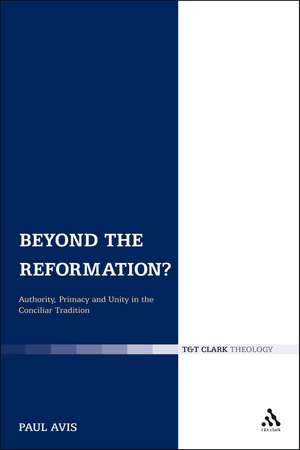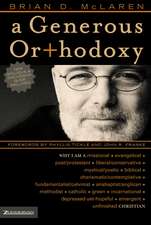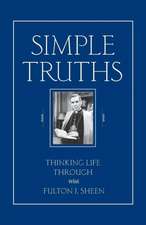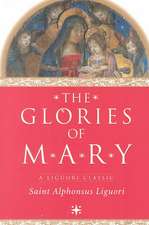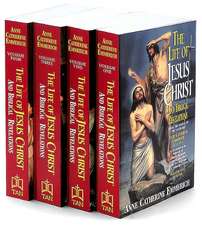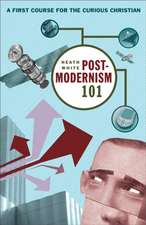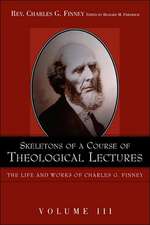Beyond the Reformation?: Authority, Primacy and Unity in the Conciliar Tradition
Autor The Rev. Professor Paul Avisen Limba Engleză Paperback – 8 oct 2008
Preț: 375.17 lei
Preț vechi: 421.53 lei
-11% Nou
Puncte Express: 563
Preț estimativ în valută:
71.80€ • 77.96$ • 60.31£
71.80€ • 77.96$ • 60.31£
Carte tipărită la comandă
Livrare economică 23 aprilie-07 mai
Preluare comenzi: 021 569.72.76
Specificații
ISBN-13: 9780567033574
ISBN-10: 0567033570
Pagini: 256
Dimensiuni: 156 x 234 x 20 mm
Greutate: 0.41 kg
Editura: Bloomsbury Publishing
Colecția T&T Clark
Locul publicării:London, United Kingdom
ISBN-10: 0567033570
Pagini: 256
Dimensiuni: 156 x 234 x 20 mm
Greutate: 0.41 kg
Editura: Bloomsbury Publishing
Colecția T&T Clark
Locul publicării:London, United Kingdom
Caracteristici
Scholarly, but written for a wider readership of church professionals, students and lay people
Cuprins
Analytical Contents Abbreviations used in the text Introduction 1.The Church as Mystery and Institution 2.Models of Authority in the Church 3.The Emergence of Monarchical Authority 4.Precursors of Conciliarism 5.Wyclif and Hus: Subversive Non-Conciliarists 6.The Great Schism of the West and the Council of Pisa 7. The Re-unification of the Church and the Council of Constance 8. The Eclipse of Conciliarism and the Council of Basel 9. The Legacy of the Conciliar Movement 10. The Continental Reformation and Conciliar Thought 11. Conciliarity in the Anglican Tradition 12. Conciliarity, Primacy and Unity in the Western and Eastern Churches 13. Semper Reformanda: the Imperative of Reform in the Conciliar Movement, the Reformation and the Modern Church Bibliography Index of Names
Recenzii
Avis gives a forceful and convincing demonstration of the relevance of the conciliar tradition for the contemporary church; he raises precisely the issues we need to be discussing concerning authority, reception, and role of the entire community in the decision-making of the church. His ecumenical insights are rooted in a thorough grasp of the historical realities; he presents an eminently readable introduction to a portion of our past we ignore at our loss. This is a book I will return to regularly in the future.
Paul Avis's study is a timely reminder of the importance of the late-medieval conciliar tradition for questions about the reformation and reunification of the Western church. A historian and a practical ecumenist, he shows us the pervasive influence of conciliarist constitutional principles through the intervening centuries, as well as their continuing relevance to our contemporary search for Christian unity. And - of special interest to Anglicans at a difficult juncture - he draws out especially the promise of these principles for the episcopally ordered communions. There is much to be learned here by those who concern themselves with the church in our times and its roots in the past.
This timely study of the historical debates between conciliarists and monarchists/papalists throws light on the catholicity of the Church. It shows the continuing relevance of conciliarism and the necessity of an ecumenical balance between the two principles of collegiality and of primacy. It will be an excellent introduction to contemporary dialogues on the structure of the Church.
... thoughtful and challenging... a rich texture of scholarship and pithy comments... of major historical and ecumenical importance... a detailed and sensitive study that substantiates common ground and hope for the future.
This book marks a watershed in fifteenth-century conciliar research, its history, principles and lasting influence.
...Avis presents here a careful, descriptive analysis of fourteenth- and fifteenth-century conciliarism and then proceeds to an examination in the light of the conciliarist legacy of the ecclesiological preoccupations and practices of the churches of the Reformation. The account he gives is solid and informative...
This is a well-researched, fluently written book that deftly combines historical analysis with the interrogation of present-day concerns.
Solid scholarship and passionate pleading by a senior Anglican ecumenist.
... Avis is among the foremost commentators on the present state of Catholic-Protestant dialogue.
Paul Avis describes his timely book as 'a study of authoirty in the Christian Church: its principles and theological basis; its structures and organisation; and its dynamics, the way it is exercised in practice.' It ought, therefore, to be required Anglican reading in the present times.
Mention -Book News, February 2009
|Reviewed by Mark W Elliott, Theological Book Review Vol.19 No.1 2007
Reviewed with another book on the same subject, by Andrew Atherstone in ANVIL vol.24 no.4 2007
...a theologically sophisticated, broadly based, open and yet passionate argument for a more clearly defined Anglican Communion.
As Avis' readers will expect, this is a work of thorough historical scholarship...I found the book enjoyable and most informative...the book is an excellent resource, and will be of value to ecclesiologists, historians and students of the Reformation alike.
Whilst the rapid and exciting pace of ecumenical development has definitely slowed, worksuch as Paul Avis' Beyond the Reformation offers careful and wise engagement with ecumenicalissues that demonstrate that ecumenism is still a powerful driver of major ecclesiologicalcontributions.
Paul Avis's study is a timely reminder of the importance of the late-medieval conciliar tradition for questions about the reformation and reunification of the Western church. A historian and a practical ecumenist, he shows us the pervasive influence of conciliarist constitutional principles through the intervening centuries, as well as their continuing relevance to our contemporary search for Christian unity. And - of special interest to Anglicans at a difficult juncture - he draws out especially the promise of these principles for the episcopally ordered communions. There is much to be learned here by those who concern themselves with the church in our times and its roots in the past.
This timely study of the historical debates between conciliarists and monarchists/papalists throws light on the catholicity of the Church. It shows the continuing relevance of conciliarism and the necessity of an ecumenical balance between the two principles of collegiality and of primacy. It will be an excellent introduction to contemporary dialogues on the structure of the Church.
... thoughtful and challenging... a rich texture of scholarship and pithy comments... of major historical and ecumenical importance... a detailed and sensitive study that substantiates common ground and hope for the future.
This book marks a watershed in fifteenth-century conciliar research, its history, principles and lasting influence.
...Avis presents here a careful, descriptive analysis of fourteenth- and fifteenth-century conciliarism and then proceeds to an examination in the light of the conciliarist legacy of the ecclesiological preoccupations and practices of the churches of the Reformation. The account he gives is solid and informative...
This is a well-researched, fluently written book that deftly combines historical analysis with the interrogation of present-day concerns.
Solid scholarship and passionate pleading by a senior Anglican ecumenist.
... Avis is among the foremost commentators on the present state of Catholic-Protestant dialogue.
Paul Avis describes his timely book as 'a study of authoirty in the Christian Church: its principles and theological basis; its structures and organisation; and its dynamics, the way it is exercised in practice.' It ought, therefore, to be required Anglican reading in the present times.
Mention -Book News, February 2009
|Reviewed by Mark W Elliott, Theological Book Review Vol.19 No.1 2007
Reviewed with another book on the same subject, by Andrew Atherstone in ANVIL vol.24 no.4 2007
...a theologically sophisticated, broadly based, open and yet passionate argument for a more clearly defined Anglican Communion.
As Avis' readers will expect, this is a work of thorough historical scholarship...I found the book enjoyable and most informative...the book is an excellent resource, and will be of value to ecclesiologists, historians and students of the Reformation alike.
Whilst the rapid and exciting pace of ecumenical development has definitely slowed, worksuch as Paul Avis' Beyond the Reformation offers careful and wise engagement with ecumenicalissues that demonstrate that ecumenism is still a powerful driver of major ecclesiologicalcontributions.
